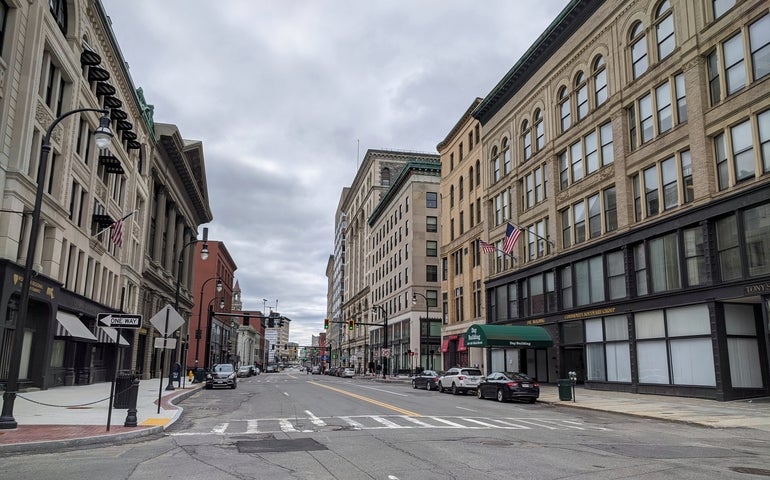The COVID-19 pandemic injected a bolt of momentum into a work-from-home trend that was already underway and will likely become permanent or more frequent for many workers, a societal change with impacts on everything from traffic and public transportation to commercial real estate, the dynamics inside homes, and the health of small businesses that rely on workers who pop in before, during and after their shifts.
“I think all employers who have job categories that enable telecommuting or work from home or greater flexibility – all of them are exploring that,” Greater Boston Chamber of Commerce President Jim Rooney told the News Service in a recent interview. “I’ve had several tell us that they didn’t have a very liberal work-from-home policy before all of this, but coming out of it, they will.”
“It is a very, very active conversation in the business and employment community right now,” he added.
In a policy brief published Tuesday, the Pioneer Institute released results of a 10-question survey that found nearly 63 percent of respondents preferred to work from home one day per week, and a plurality would like two to three days a week at home, even after a COVID-19 vaccine is available.
The best part of working from home was avoiding the commute, a change cited by 48 percent of respondents. Thirty-four percent cited improvements in their daily routines, including scheduling flexibility or break activities. Only 10.7 percent said “fewer interruptions” was their favorite aspect of remote work.
The worst part of work-from-home was its “isolating nature,” according to Pioneer’s survey, with 53 percent of respondents missing social interactions at their former workplaces. Smaller subsets of 10 percent or less cited an inability to focus on work while at home, inadequate computing infrastructure, or eating too much (6.3 percent).
More workers staying home and not traveling to offices will have impacts on the flow of customers at small businesses located near their workplaces.
“The Old Idea”
In Connecticut, Gov. Ned Lamont made headlines this month when he suggested that scores of workers who have long been commuting in and out of New York City might choose to spend their days in Connecticut, working from home.
Ridership on Metro North trains into the city plummeted 95 percent early in the pandemic, Lamont told Bloomberg on May 13, but the decision was made to keep running trains to serve first responders and others who had no other way to get to work.
“I think you’re going to find that the old idea of a commuter going into New York City five days a week, may be an idea that’s behind us,” Lamont said. “I think we found at the end of this COVID session that we’re realizing that telecommuting, in many cases, works. And if you have a great job that seems to be geographically located New York City, you can do it two thirds of the time from your home in Stamford.”
Businesses that lease office space may also be rethinking whether to continue on as commercial tenants or whether they can reduce their footprints.
“It has economic implications, no question about it,” Rooney said. “People are thinking about it because they know that work from home conversation is not only taking place, it’s being encouraged to take place, certainly as you talk about the T. If you talk to [state Transportation] Secretary Pollack, she’s advocated more work from home, even before this. So she’s a big advocate for it, and I’m sure she’ll be a stronger advocate for it. So it’s not just a COVID-19 phenomenon. It’s being advocated within government as a means to deal with issues of public transportation and commuting congestion anyway. The real estate community is thinking through what does this mean in terms of both the amount of physical space and what the design of that space looks like.”
On May 15, three days before he detailed his economic reopening plan, Gov. Charlie Baker saluted private sector employers like Blue Cross Blue Shield of Massachusetts, Raytheon, Wayfair, MassMutual and Takeda that would stick with allowing employees to work from home for now, saying the transition is a way to fight a virus that is able to infect people working in enclosed spaces and protect employees who may be at high risk of being infected.
“Now as we look to the weeks and months ahead, we’re urging businesses to continue to promote remote work and work-from-home as much as possible,” Baker said, noting half of the executive branch workforce under his watch has been working remotely since late March.
The governor this month extended policies governing remote work in the executive branch “for the foreseeable future” and the first phase of his reopening plan will limit capacity at offices to 25 percent, effectively heightening the importance of remote work.
The Pioneer survey, which used social media outreach and email marketing, was conducted April 22 to May 15 and drew more than 700 responses.
From a productivity standpoint, an important gauge for employers, more survey participants said “they get more done when working from home than said they get less done, although the majority of respondents reported little change between the workplace and a remote setting.” Researchers also noted that people who responded in May “tended to report increased productivity at home more often than those who responded to the survey in April.”
“These survey results make clear that there is significant interest in more widely available work-from-home policies among the current workforce,” brief author Andrew Mikula concluded. The institute plans to conduct further surveys to gauge changes in sentiments about working from home.

